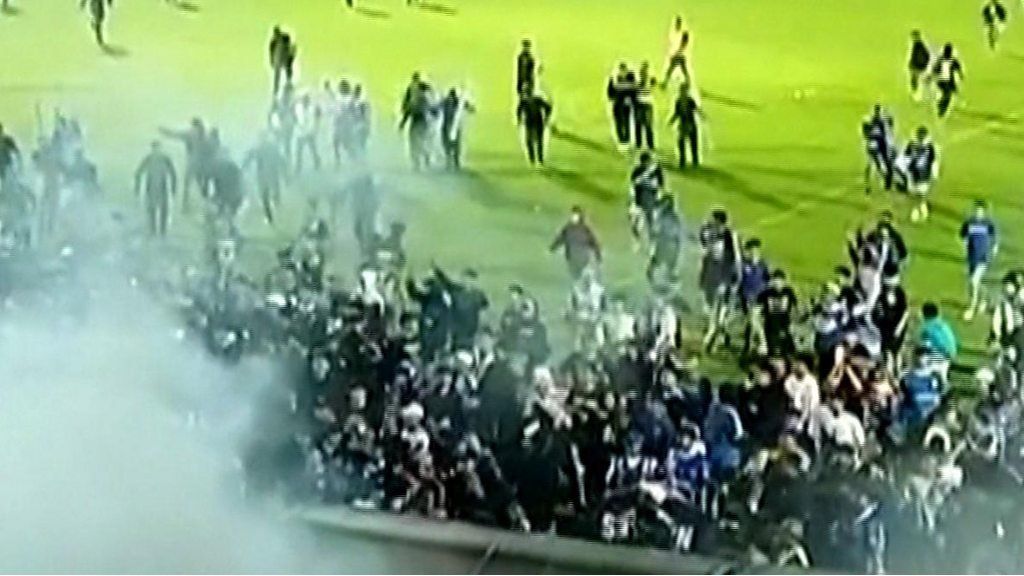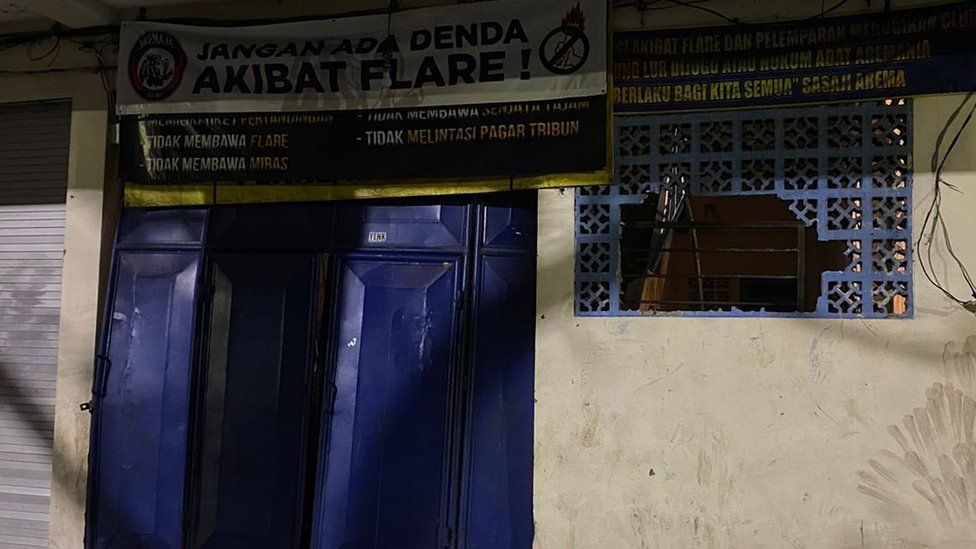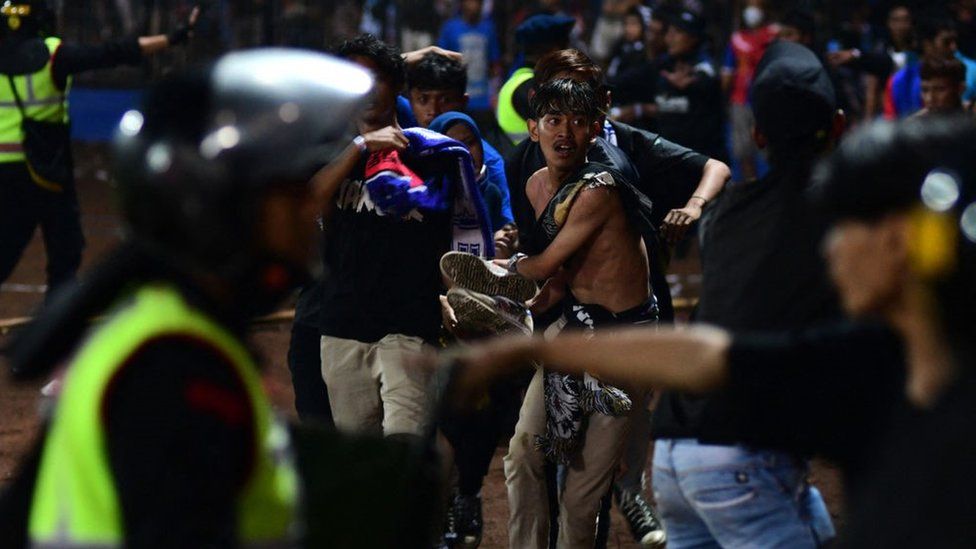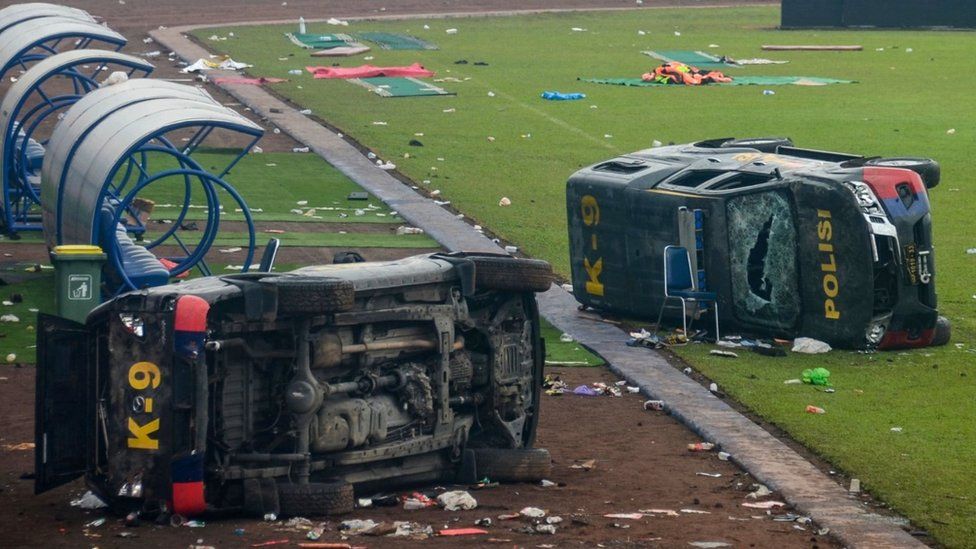



Scores killed at Indonesia football match
Hundreds were also hurt in aftermath of home team Arema FC's loss to bitter rivals at the overcrowded stadium late on Saturday in Malang, East Java.
The crush took place after police tear-gassed fans who invaded the pitch.
As panic spread, thousands surged towards Kanjuruhan stadium's exits, where many suffocated.
Fifa, the world's governing football body, states that no "crowd control gas" should be carried or used by stewards or police at matches.
The organisation's president Gianni Infantino said it was "a dark day for all involved in football and a tragedy beyond comprehension".
One eyewitness told the BBC that police had fired numerous tear gas rounds "continuously and fast" after the situation with fans became "tense".
Next to one exit gate a hole smashed through the wall testifies to the desperation to escape the crush that developed.

A hole next to the exit gates that were closed testifies to the desperation of those inside
There are candles next to the gate, put there by supporters to remember the victims.
The doors themselves are slanted outwards, a sign of the sheer level of force from the inside.
Indonesian officials at one stage put the death toll in the disaster as high at 174 people, but this was later revised downwards.
President Joko Widodo has ordered that all matches in Indonesia's top league must be stopped until an investigation has been carried out.

Police fired tear gas, leading to a crowd crush and cases of suffocation
Videos from the stadium show fans running on to the pitch after the final whistle marked the home team's 2-3 defeat, and police firing tear gas in response.
"It had gotten anarchic. They started attacking officers, they damaged cars," said Nico Afinta, police chief in East Java, adding that two police officers were among the dead.
"We would like to convey that... not all of them were anarchic. Only about 3,000 who entered the pitch," he said.
Fleeing fans "went out to one point at the exit. Then there was a build-up, in the process of accumulation there was shortness of breath, lack of oxygen", the officer added.
Videos on social media show fans clambering over fences to escape. Separate videos appear to show lifeless bodies on the floor.

Damaged police vehicles lay on the pitch inside Kanjuruhan stadium
The Indonesian football association (PSSI) said it had launched an investigation, adding that the incident had "tarnished the face of Indonesian football".
Violence at football matches is not new in Indonesia, and Arema FC and Persebaya Surabaya are long-time rivals.
However Persebaya Surabaya fans were banned from buying tickets for the game because of fears of clashes.
Chief Security Minister Mahfud MD posted on Instagram that 42,000 tickets had been sold for the match at Kanjuruhan stadium, which has a stated capacity of 38,000.
President Widodo called for this to be the "last soccer tragedy in the nation" after ordering that all Liga 1 games should be paused pending an investigation.
Muhamad Dipo Maulana, 21, who was at the match, told BBC Indonesian that after the game had ended a few Arema fans went on the pitch to remonstrate with the home team players but were immediately intercepted by police and "beaten".
More spectators then took to the pitch in protest, the supporter said, adding that the situation became "tense".
"Police with dogs, shields, and soldiers came forward," Mr Dipo told the BBC.
He said he had heard more than 20 tear gas shots towards spectators at the stadium.

Muhamad Dipo Maulana said he saw people suffocating while trying to get out of the stadium
"There was a lot, like bang, bang, bang! The sound was continuous and fast. The sound was really loud and directed to all the stands," he added.
Mr Dipo said he saw people in disarray, panicking and suffocating while trying to get out of the stadium. There were many children and old people who were affected by the tear gas, the eyewitness added.
The stampede is one of the worst of a tragically long line of stadium disasters.
In 1964, a total of 320 people were killed and more than 1,000 injured during a stampede at a Peru-Argentina Olympic qualifier in Lima.
In 1985, 39 people died and 600 were hurt at the Heysel stadium in Brussels, Belgium, when fans were crushed against a wall that then collapsed during the European Cup final between Liverpool (England) and Juventus (Italy).
In the UK, a crush developed at the Hillsborough stadium in Sheffield in 1989, resulting in the deaths of 97 Liverpool fans attending the club's FA Cup semi-final against Nottingham Forest.
-- Courtesy of BBC Sport